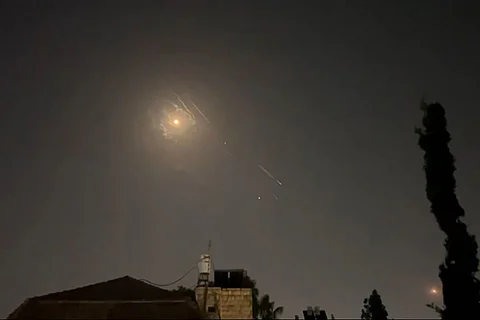

The Middle East is on the brink of war. Following the April 1 attack on an Iranian consulate building in Damascus, Syria by Israeli jets, and the killing of several Iranian military and diplomatic personal, Iran had threatened to wreak vengeance on Israeli and US facilities in the region and it did so on Sunday with its drone attack. Predictably, the US and Israel have said they will respond in equal measure.
There is nervousness all around. The stage is set for an all out shooting war beyond the borders of Gaza, a war that may not be restricted to the region.
Unquestionably, this latest round of widening hostilities can be blamed squarely on the trigger-happy, right-wing Israeli government. Israel’s Prime Minister, Benjamin Netanyahu, close to popular ouster at home, is doing his best to widen the war beyond Gaza to divert attention. The US, despite all of Joe Biden’s soothing words, continues to arm and support Israel even as the country slowly degenerates into a rogue state on the world stage.
Israel started it
What was the need to attack an Iranian consular building in Damascus? It is a flagrant violation of international law on two counts. A consular enclave is Iranian soil by extension. Beyond that, Israel seems to have no qualms about entering Syrian airspace and territory at will to carry out assassinations of whoever they designate a ‘terrorist’. Israel started it. It attacked both Iran and Syria first.
On the other hand, Iran, despite all its sabre-rattling, had made it clear it is not for escalating the Gaza war. Doubtless Iran has supported militant Shia groups which are skirmishing with Israel – like the Hezbollah in Lebanon, and the Houthis in Yemen. But the sporadic rocket-fire and occasional raids on US outposts and western shipping are designed to bear diplomatic pressure to end the Gaza war, and not to exacerbate a regional conflict.
As we have noted earlier in these columns, we already have a regional conflict at hand. The Houthis since November 19 have been attacking shipping linked to the US or Israel in retaliation against Israel’s invasion of Gaza. Till the end of February, Ambrey Analytics, a global risk management firm, estimated 40 ships had been hit, commandeered or sunk in the Gulf of Aden and the Red Sea.
Though these attacks have not slowed up Israel’s Gaza war, the global economic repercussions on trade have been severe. The 193-km Suez Canal, which hosted nearly 24,000 vessels last calendar year, and caters to 12 percent of global trade, is virtually closed. On the other hand, the longer 4,000 km route via Africa’s Cape of Good Hope, has pushed up freight costs and risk insurance premiums.
Instead of rolling back the crisis, Israel has been extending the war through bombings and assassinations of selected targets in Lebanon and Syria. The targeted killing of the Revolutionary Guards commander Mohammad Reza Zahedi and other Quds officers on 1 April seems to have been the final straw.
Ayatollah Ali Khameni in Teheran, at a funeral speech, threatened Israel “must be punished and it shall be”, as it was tantamount to an attack on Iranian soil. The Israeli response was quick: Netanyahu, standing in front of American-made F-15 fighters at the Tel Nof airbase in southern Israel, told reporters: “Whoever harms us, we will harm them.”
Palpable tension
As war clouds gather, US intelligence is predicting coordinated attacks on embassies and other installations in the next few days. Joe Biden has promised retaliatory strikes, and has banned US diplomats in Israel from travel outside Tel Aviv. Lufthansa, one of the 2 western airlines still flying to Teheran, has suspended all flights. The Middle East is bracing for a widened Gaza war.
The immediate impact of an extended conflict is already visible. Possibilities of a West Asia conflict have pushed up crude oil prices beyond $90 a barrel. A few days ago Alireza Tangsiri, commander of Iran’s Islamic Revolution Guards Corps (IRGC) naval forces, said Iran could shut down the Hormuz Strait, though he said the option was not on the cards yet.
The Hormuz Strait is the choke point for oil as most of Saudi Arabia’s oil terminals are located on that coastline. As many as 85-100 oil tankers pass on a daily basis through the Strait. In terms of percentage the Middle East’s OPEC members account for 67 percent or over 1,000 billion barrels of the world’s proven oil reserves. If Iran was to ever carry out such a threat, there will be a firefight to keep the oil trade lines open by the Western powers.
In the theatre of Eastern Europe, the Ukraine war grinds on without an end in sight. A few weeks ago, Vladimir Putin, after his ‘election victory’ alluded to the possibility of a World War III. Iranian foreign minister, Hossein Amir-Abdollahian, has been jetting to Saudi Arabia, Qatar, the United Arab Emirates, Iraq and Turkey to try and reach a Middle-East consensus against Israel.
The tension is palpable, and even a small spark can set off a galloping conflagration. The UK, Germany and others are scrambling to plead with Iran to observe restraint; but possibly their efforts would be served if they were directed to Israel and its ally, the US, to convince them to address the root of the problem: ending the invasion of Gaza.